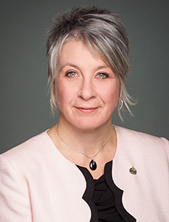Archived information
This content is archived because Status of Women Canada no longer exists. Please visit the Women and Gender Equality Canada.
Archived information is provided for reference, research or recordkeeping purposes. It is not subject to the Government of Canada Web Standards and has not been altered or updated since it was archived. Please contact us to request a format other than those available.
Minister's Message
I am pleased to present Status of Women Canada’s Departmental Performance Report for the year 2015-16.

As we approach our country’s 150th anniversary next year, Canadians can feel very proud of the progress we have made advancing the status of women and girls in Canada. At the same time, we are mindful that full gender equality remains elusive in our society. Gender-based violence remains a significant barrier to achieving gender equality, the gender wage gap persists, barriers prevent women from assuming leadership positions, and unacceptable disparities remain among women and girls of diverse backgrounds.
There is work to be done by all of us to change attitudes within our society, and practices within our institutions, which reinforce and perpetuate gender inequality. Building on the Prime Minister’s leadership in appointing the first ever gender balanced federal Cabinet, we are committed to leading by example in order to advance equality.
During fiscal year 2015-16, Status of Women Canada worked in collaboration with the departments of Justice and Indigenous and Northern Affairs Canada during the pre-inquiry engagement process for the National Inquiry into Missing and Murdered Indigenous Women and Girls. Not only did this pre-engagement process inform the mandate and scope of the inquiry but it also led to a significant achievement when provincial and territorial governments agreed to participate fully in the national inquiry. I also began engaging a variety of key stakeholders on the development of the Federal Strategy against Gender-based Violence, which will be evidence-based, and informed by the views of Canadians. Consistent with this approach of encouraging dialogue between stakeholders and decision-makers to inform better decisions, the federal government has restored advocacy as one of the activities that can be funded within projects supported by Status of Women Canada.
In 2015-16, the Government of Canada renewed its commitment to the use of Gender-based Analysis in its decision-making. In support of this priority, the agency reinforced its leadership role by broadening its outreach and building capacity within and beyond the federal public sector. Status of Women Canada collaborated with the Privy Council Office and the Treasury Board Secretariat to develop and launch an Action Plan on Gender Based Analysis (2016-2020). This Action Plan provides a blueprint for federal departments and agencies to develop and implement internal frameworks to support the sustainable use of Gender-based Analysis in the development of federal initiatives.
The Government of Canada has demonstrated its full support for the United Nations sustainable development goals which reflect many Canadian core values, including equality between women and men. We are committed to leading by example in implementing the UN goal to “Achieve gender equality and empower all women and girls”, ensuring that no one is left behind in the process or outcome. Accordingly, the Government of Canada has developed a comprehensive results framework, identifying concrete outcomes that align with the UN gender equality goals. This framework will provide a roadmap for Canada to coordinate our efforts, leverage partnerships and engage communities and institutions toward the ultimate goal of gender equality in all aspects of Canadian life.
Canada demonstrated renewed leadership at the 60th Session of the United Nations Commission on the Status of Women. Through active engagement, strategic interventions and collaboration, Canada influenced a number of key outcomes from this year’s session. In addition, as a result of its renewed international engagement on gender equality issues, Canada successfully submitted its candidacy for a seat on the UN Commission on the Status of Women for the 2017-2021 term.
Status of Women Canada continues to support key federal initiatives that help to advance gender equality. This includes support for increased social infrastructure investments in shelters and transition housing, which will help to ensure those fleeing domestic violence have a place to turn. It also includes support for the creation of the new Canada Child Benefit, and for the federal government’s new approach to making Governor-in-Council appointments that will enhance diversity.
The broad scope of work undertaken by Status of Women Canada is crucial to achieving our shared goals, and advancing the Government of Canada’s gender equality agenda. As we pursue this journey, we will engage Canadians, work with our partners in the public, private and voluntary sectors, and make decisions informed by the best available evidence and expertise. By working together, we can build the healthy, inclusive society we want as a lasting legacy for our children and grandchildren.
The Honourable Patty Hajdu, P.C., M.P.
Minister of Status of Women
- Date modified: